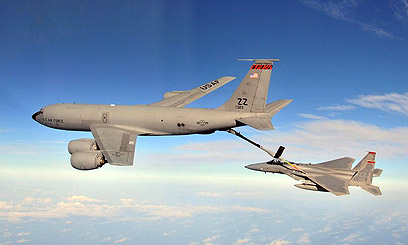
"This was a historical landmark in the defense relations between the US and Israel," said Amos Gilad, the director of policy and political-military affairs at the Defense Ministry.
Related articles:
- Obama to give Israel $70M for Iron Dome
- Poll: US Jews solidly back Obama
- Romney can expect warm Israeli reception
The legislation, knowns as the "United States-Israel Enhanced Security Cooperation Act of 2012," allows Israel to purchase American KC-135 aerial refueling aircraft for the first time. Thus far, the Bush and Obama administrations refused to sell planes of this kind to the Jewish state, primarily in order to bar it from launching a massive aerial strike on Iran.

KC-135 refueling jet
In all likelihood, such a military operation would involve F-15I and F-16I fighter jets, as well as helicopters, all of which will have to refuel on their way to the Islamic Republic, and on the return trip. Mid-air refueling capabilities are therefore essential for the mission.
So far, Israel has had to buy used commercial Boeing 707 airliners and convert them into tanker jets, a far from ideal solution considering the planes were originally designed for passenger flights. Just last week an accident occurred during an exercise involving such aircraft.
But the road between the ratification of the legislation and an actual deal to buy or lease such planes is still long; it could be years before Israel gets its hands on such equipmnet. Nevertheless, the law has been put in place, and now the time has come to find funding and agree on the technical details.
The legislation, which provides for special aerial armament, is also likely to allow Israel to acquire bunker buster bombs, a privilege previously denied by the Bush Administration. Israel has also asked for cruise missiles, but as of yet it remains unclear whether this request will be granted. Moreover, the bill does not explicitly address Jerusalem's request for satellite technology that can be used for intelligence purposes and to obtain real time missile warnings.
The law essentially requires the current administration and the next one to provide Israel with weapons systems, intelligence data and logistical aid. Every six months, the leaders in the US will have to report to Congress about the steps they have taken to implement the legislation.

Obama signs legislation (Photo: AFP)
The legislation, which was passed by a solid majority in both houses of Congress, specifies what the US government must do to in order to put the United States' commitment to Israel's security into practice. It explicitly asserts that the US must maintain Israel's qualitative advantage in the military field, and especially when it comes military technology.
This assertion is significant considering the expansive arms deals that the US is in the process of signing with the Arabs states of the Gulf – deals that aim to protect the latter region from the Iranian threat. As part of these agreements, Saudi Arabia, the United Arab Emirates and Kuwait are to receive new weapon systems that could upset the strategic balance in the region to Israel's detriment.
It must be noted that the Obama Administration has been unprecedentedly responsive to Israel's acquisition requests across the board, even prior to the latest legislation. And the incumbent president is willing to go much farther to accommodate Israel when it comes to missile defense; on Friday, during the bill's signing in Washington, he announced that he is adding $70 million to bolster the production of Iron Dome batteries.
The timing and the ceremoniousness chosen for the signing of the bill is unmistakable. Throughout his term, Obama has given his stamp of approval to some 500 laws, most of which were signed hastily and informally. For the sake of comparison, when he allowed Israeli entrepreneurs to open small businesses in the US and bring their families along, no cameras were present. This time, the president exercised a campaign-season privilege to emphasize his commitment to Israel's security.
But the content of the legislation is genuine, officials say.

Romeny and wife arriving in Israel (Photo: Reuters)
"This law has elements that are more important than money," one Israeli official said. "Israel can, with the US' help, to maintain its deterrence advantage in the face of potential enemys' aggression. By cooperating with Israel, the US has obtained a reliable, democratic and technology-oriented partner in promoting its strategic interests."
Defense Minister Ehud Barak has thanked Obama and Congress for the measure, being well aware that the statement would irk the US Republicans and Romney, who has arrived in Israel on Friday. Barak is to meet with US Secretary of Defense Leon Panetta in the coming days, and the two are expected to discuss the law, as well as a possible strike on Iran.
Romney, whose trip is regarded as a showcase for his own pro-Israel stance ahead of the elections, is expected to meet Prime Minister Benjamin Netanyahu on Sunday.
Ron Ben-Yishai contributed to this report
- Receive Ynetnews updates
directly to your desktop















